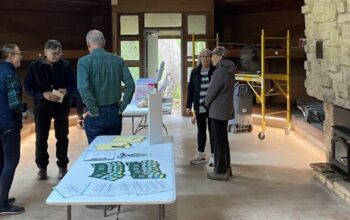
Madison’s leadership in the transportation of disabled people may be coming to an end.
The Americans with Disabilities Act of 1990 (ADA) requires public transportation agencies to provide a complementary “paratransit” service for disabled people who cannot use mainline transit. However, more than a decade earlier, Madison adopted a special transportation program for elderly and handicapped people that provided service “over and above” the lower bar stipulated by the ADA.
Madison is now looking to shed those “over and above” services. And while Metro will continue to contract rides out to other vendors, it will cease to operate its own in-house fleet of paratransit vehicles.
In the meanwhile, Dane County developed a long-term care program of its own, for which it received Medical Assistance funds from the federal government. The county passed through the funds for transportation to Metro’s paratransit program, paying Metro 60% of the cost of a ride taken by a program enrollee.
Sixty percent is not 100% but is still substantially more than the current fare of $3.25.
As of early 2018 however, Dane County will drop its own program and join most other Wisconsin counties in using the less preferred long–term care program ‘family care’ that has had different (changing, and usually much inferior) transportation services. The change means that Dane County will no longer receive Medical Assistance funding that can be passed on to Metro.
Maybe half the clients currently enrolled in the county’s program will opt to enroll in the community-based program called IRIS (Include, Respect, I-Self Direct) instead of Family Care. People in IRIS manage their own transportation budget and will also seek out a vendor who almost certainly will charge less than Metro.
Metro has anticipated this change for years, and when the change finally appeared imminent, convened a working group comprised of current or former members of the Transit and Parking Commission and its ADA Transit Subcommittee. At the meeting, the working group pondered the future once the estimated $3.9 million in pass-through funding from the county ends in early 2018.
After wading through regulatory weeds and assessing various options, the working group issued a provisional report to the Transit and Parking Commission in July of 2017. It recommended cutting costs and services to the bare minimums stipulated by the ADA.
The working-group feared that the cost of Metro’s direct paratransit service would be higher than that of other vendors, so it also recommended the elimination of Metro’s own in-house paratransit program.
The other proposals of the working-group include: 1) Start charging twice a regular mainline route fare for a rider and personal attendant combined, $4.00 compared to the current $3.25; 2) start charging the $4.00 fare for an accompanying companion whereas companions now ride free; 3) Stop providing the option of using convenience tickets in lieu of cash; 4) Limit door-to-door service only to those with a demonstrated medical necessity, rather than providing it to anyone who requests it; and 4) Eliminate the existing “leave attended” option that stipulates that a client can only be left when handed over to someone at the receiving end.
Although the report came out in early July, Metro did not officially ask the Transit and Parking Commission (TPC) to hold a public hearing on the recommendations until the TPC’s September meeting. Metro then asked that the public hearing be at the TPC’s October 11 meeting.
The short time period between when the hearing was first announced and when the hearing was to take place meets the legal requirement for announcing such a hearing, but it minimizes the amount of time the public has to debate the policy proposals.
A short time span also indicates that a decision has already likely been reached between Metro and the city, and that the public hearing is pro forma. For instance, the city budget incorporates all the recommendations of the working-group in its estimates for 2018.
Metro received substantial feedback in the October meeting, which will waste away in the bureaucratic ether. According to meeting minutes, 35 people testified against the recommendations while an additional 48 people opposed the recommendations but did not speak. Two people testified in neither support nor opposition to the recommendations. No-one spoke in favor of the recommendations!
The tragic part of all this, repeated countless times all across the country, is that people who rely on paratransit service must listen to the heart-wrenching testimony of their peers, and hear story after story about how the changes are prohibitive, and how these decisions will seriously impair their quality of life.
And as the distinction between a fare-free ‘care attendant’ and a fare-paying ‘companion’ is ambiguous, they see people’s veracity undermined when people are rewarded for stretching the truth by renaming a companion to be a caretaker.
There is a silver lining to this cloud, whether only a temporary reprieve or something more permanent. The fare changes (increasing the fare and starting to charge for ‘companions’) were supposed to take effect February 1, 2018 after being approved by the Transit and Parking Commission at its November meeting.
But the county found an additional $835,000 to pass through to Metro’s paratransit program. The money was added to the city budget with an amendment and made it possible for the Transit and Parking Commission to postpone any decision on the fare increase until there can be an equity analysis of the proposed changes.
The saga continues. Non-fare recommendations are scheduled for discussion at the Transit and Parking Commission’s December 13th meeting. According to Metro’s website:
If approved, these proposed changes will be gradually rolled out in 2018 according to the following timeline:
- Cash fare/agency ticket only Sunday, June 3, 2018
- Elimination of “leave attended” service Sunday, June 3, 2018
- Service becomes primarily “curb-to-curb” Sunday, October 7, 2018
For those who might be interested in attending, the Dec. 13 meeting will start at 5:00 p.m. in the Council Chambers of the City-County Building. The agenda will be posted five days before the meeting here.




